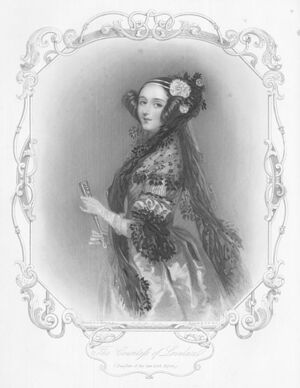Ada Lovelace (nonfiction): Difference between revisions
Jump to navigation
Jump to search
No edit summary |
No edit summary |
||
| Line 1: | Line 1: | ||
[[File:Ada_Lovelace.jpg|thumb|Ada Lovelace. Engraving circa 1838.]]'''Augusta Ada King''', '''Countess of Lovelace''' (née '''Byron'''; 10 December 1815 – 27 November 1852) was a British mathematician and writer, chiefly known for her work on [[Charles Babbage (nonfiction)]]'s early mechanical general-purpose computer, the [[Analytical Engine (nonfiction)|Analytical Engine]]. | [[File:Ada_Lovelace.jpg|thumb|Ada Lovelace. Engraving circa 1838.]]'''Augusta Ada King''', '''Countess of Lovelace''' (née '''Byron'''; 10 December 1815 – 27 November 1852) was a British mathematician and writer, chiefly known for her work on [[Charles Babbage (nonfiction)|Charles Babbage]]'s early mechanical general-purpose computer, the [[Analytical Engine (nonfiction)|Analytical Engine]]. | ||
Her notes on the engine include what is recognised as the first algorithm intended to be carried out by a machine. Because of this, she is often regarded as the first [[computer programmer (nonfiction)|computer programmer]]. | Her notes on the engine include what is recognised as the first algorithm intended to be carried out by a machine. Because of this, she is often regarded as the first [[computer programmer (nonfiction)|computer programmer]]. | ||
Revision as of 15:23, 11 June 2016
Augusta Ada King, Countess of Lovelace (née Byron; 10 December 1815 – 27 November 1852) was a British mathematician and writer, chiefly known for her work on Charles Babbage's early mechanical general-purpose computer, the Analytical Engine.
Her notes on the engine include what is recognised as the first algorithm intended to be carried out by a machine. Because of this, she is often regarded as the first computer programmer.
Nonfiction cross-reference
Fiction cross-reference
External links
- Ada Lovelace @ Wikipedia
